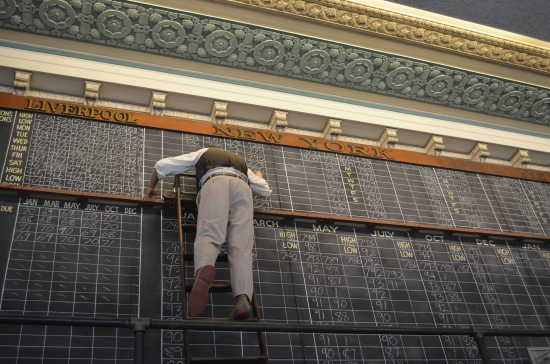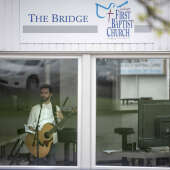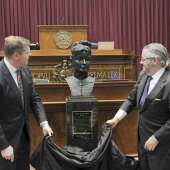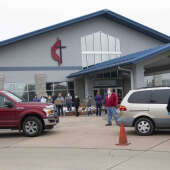
The wall-to-wall trading board inside the Cotton Museum at the Memphis Cotton Exchange.
Down off the bluff and south out of Memphis, Mom and I joined Highway 61 on its way to Clarksdale, Mississippi. It was hot, well past 90, and up ahead the blacktop grew a shimmering, silver mirage. Green grew in various forms beside the road, and like the road grew straight, except for crooked kudzu, which draped untamed topiary over every in-between. Rice fields were abundant and greenest of all, their lushness and density broken only by curving troughs of water the color of current sky. Cotton, too, grew green, but less vibrantly and with ample space between rows its fields presented the mesmerizing, split-second, green-brown, plant-dirt, broken view, open one of orderly row crops whooshing past.
It was the belly of blues country we were after, and our four-day, three-night romp had us on the move: Wednesday, Cape Girardeau to Clarksdale (with a side-trip to Helena, Arkansas), Thursday, Clarksdale to Oxford, Friday, Oxford to Memphis, Saturday, home. Soon after a stop at a salvaged train depot turned visitor's center near Tunica, we tuned our radio to KFFA AM 1360 and angled due west on Highway 49 over the Mississippi River.
Helena is home to the longest running blues radio program in the history of broadcasting. King Biscuit Time began in 1941 and was hosted by famous blues harpist Sonny Boy Williamson. The show's significance lay in transporting the country blues to a far wider audience and influencing a new generation of blues musicians, as well as an isolated existing one. Seventy plus years later, KBT goes on through the voice of another Sonny, Sonny Payne, Jr. Airing every weekday between 12:15 and 12:45 p.m., it's broadcast right inside the room that houses Helena's Delta Cultural Center.
In the past, steamboat traffic, then the railroad, kept Helena properly fed and watered, but now, like so many rural river towns, Helena's riverfront appears to exist on memory alone--that and the few locals who've seemingly made it their life's work to keep it going. A few blues tourists--many of them Europeans on a New Orleans to Memphis, Highway 61 pilgrimage of their own--do manage to cross the river every so often, but the city relies on its annual King Biscuit Blues Festival to keep its distinguished history alive. This year's runs October 10-12 and features headliners the Gregg Allman Band, Robert Cray, and Marcia Ball.
Even in our mechanized age, the board-flat Delta still conjures the single most enduring vision of the sharecropping south--that of tenant farmers, perpetually tied to the land and poor as proverbial dirt, hand-picking cotton for landowning gentry. Take that vision back a few generations and those poor farmers become slaves, those landowners, masters. To this day, the region remains elemental and unadorned, a land of soil and sky, plant and dirt, black and white, have little and have much, field and front porch, hot sun, restless night, and stirring song. This is the poetry the Delta seems to summon at least, a poetry which began fashioning itself into a new music which would come to be called the blues sometime around the 1890s.
Helena behind us, we hit Clarksdale inside forty minutes and headed straight for the Hopson Plantation. In the early 1940s the site boasted the first entirely machine-picked cotton operation in the world. Nowadays, it stakes its claim on another business model entirely and has been refashioned into the sprawling Shack-up Inn.
Blues music sprung up in the Delta spurred in part by the harsh conditions on plantations exactly like the Hopson. Our shelter for the night, as were all on offer, looked the part of a weathered sharecropper shack out of some 1930's depression-era photograph. Covered in rusted tin and with rough-hewn hardwood floor to ceiling, it had two spare rooms flanking a serviceable kitchen and bath.
The thought of seeking rest and recreation at a place with such labor-intensive history--even one so cleverly named and conceived--had at first seemed akin to planning to picnic in a cemetery. But always up for lodging out of the ordinary, and with TripAdvisor reviews altogether glowing, we'd given in and booked.
On rustic cue, the Shack-up beguiled. Written up and down like a roadhouse bathroom, the walls of our chosen abode announced nearly universal praise for the place. There was a television, but it was programmed to play the blues music channel and nothing else. The bar and stage off the lobby were appropriately throwback, and we had to ask twice when the check-in clerk said we could come back anytime for all the beer we could drink. Satisfied, we headed into town.
If the Delta in its entirety--geographically-speaking the 6,250 square mile fertile crescent enclosed within parentheses created by the Mississippi and Yazoo rivers--is the birthplace of the blues, Clarksdale is undoubtedly the cradle. Beaten-down but story-rich, these days its downtown gives off the gritty charm of a long-abandoned city neighborhood on the rebound. Former stores with broken plate glass windows languish near newer ventures fronted by fresh flower pots. The grand marquee of the once-palatial Paramount Theater now stares blankly at newcomer Yazoo Pass Espresso Bar, Bistro, and Bakery.
Whole blocks are empty, but whole blocks are blooming too. Hope--and revenue--lay in the dozens of businesses which cater to blues tourists. And with eateries, accommodations, and retail shops ranging from the upscale to the lowdown, Clarksdale is nothing if not authentically itself. Sites such as the Riverside Hotel, Red's Lounge, Cat Head Delta Blues and Folk Art, and the Delta Blues Museum are singular and not to be missed.
The Ground Zero Blues Club is the town's modern monument to blues music. Half-filled but happening when we arrived, the former cotton-grading warehouse pays homage to Delta juke joints of yesteryear. Its front porch sports an assortment of chairs ranging from the backseat of a van to a ripped wing-back on blocks. Inside, its walls too are covered with felt-tip messages of adoration, and its air filled with the smell of home-style cooking. Up front, a young woman and her band belted blues favorites, and it wasn't a stretch to imagine ourselves back in one of those bare bones Delta jukes of the blues' golden age.
It is altogether appropriate that a music as real and unpretentious as the country blues would find a home in a place like Clarksdale. While jazz may summon the slick sophistication of the city, country blues is a dirtier affair--often drunken-seeming, sometimes demonic-sounding. It demands experience, even tragedy, as its prerequisite and bubbles up out of the unconscious in the language of the everyday. Darkness fallen, Mom and I made tracks to our quarters, but not without a planned stop at the Crossroads, where the intersection of highways 61 and 49 gives the blues its most famous legend.
Robert Johnson remains one of the most talked-about figures in blues history due to his preternatural gifts and premature death. Gone by the age of 27, his haunting voice and masterful guitar playing are held up to this day as blues ideals. The Crossroads is the place where Johnson, a theretofore average musician, purportedly met the devil on the road and exchanged his soul for musical immortality. Alas, like most myths, the site itself is better left to the imagination. No longer dirt roads, and not yet midnight, we paid our respects and moved along. Thursday morning, it was out of the flatland and on to Mississippi Hill Country.
Culturally distinct from the Delta, well-mannered Oxford sports more pastels than blues. Inimitable though it is--that quintessential square, those quintessential southerners--it doesn't exactly cry out toil and strife. But with a panel of blues experts and music legend Johnny Winter in town for its 4th annual blues fest, we decided to give the precious little place its due.
Mostly, our 24 hours there offered living examples of the far-reaching influence a regional, idiosyncratic style of music once had on a young, white generation of 1960's rock n' rollers. The scholars further contextualized our understanding of the blues through their explanations of segregated Mississippi's sufferings during the civil rights era. Now near seventy, it was then that they set out on field missions of their own to record the music they loved in the deeply divided state where it was still sung. Winters, too, is now near seventy, and though he sits his entire set, he still retains his lightning speed. He proved a bit too fast and loud for our taste, but it didn't take a degree in musicology to hear the acoustic blues of the first half of the 20th century below his furious fretwork.
It was Muddy Waters who rightly declared, the blues had a baby, and they named it rock and roll, and Friday it was back to Memphis to take in that birthplace. There, at Sun Records, an X still marks the spot where Elvis recorded his first hit single, a rocked out blues tune by Arthur "Big Boy" Crudup called That's all right in July of 1954. And it's the place where Ike Turner, a year before, waxed Rocket 88, often called the first ever rock n' roll song.
Wrapping up our trip, we traveled downtown to the Cotton Museum at the Memphis Cotton Exchange. With exhibits linking the dark history of the Delta to the empire-making story of King Cotton, the museum takes a thoughtful look at its region, warts and all. While other visitors walked the magnificent room where an elite group of wealthy, white traders once stood at the center of the global cotton economy, I stood staring up at a wall-to-wall pricing board which once served as a minute-by-minute exchange index. Suddenly a succession of begats coalesced in my head.
I thought of the great brown river one block away, and how it begat the rich soil so pivotal to the Delta's history. I saw that soil--and with it the Delta climate--through the eyes of the first planters who had realized its cotton-producing perfection. And I realized how King Cotton, a high maintenance crop if ever there was one, had helped begat, first slavery, then a post-Civil War sharecropping system which was nearly equal in its despotism. Finally, I linked that sharecropping system and its legendary hardships to the blues music Mom and I had traveled to find.
The Delta offers a prime example of what one could call the nowhere else and not again factor--where a combination of dynamic forces including geography, technology, economy, and living, breathing human beings collide and produce a unique cultural strain, in this case, the Cotton Kingdom, its horrors and its triumphs. In other places, similar confluences create lasting masterpieces of other varieties, but in the Delta it's the blues. Nowhere else and not again we repeated on our drive back north. The Mississippi Delta casts one special spell.
 Local News 4/19/24Inside Becca’s Closet: A mission to dress teens for formal eventsThe organization Becca’s Closet, which helps young girls get access to formal dresses for dances and proms, is celebrating its 20th anniversary this year. Cape Girardeau is the home to one of two Missouri chapters, and one of 51 in the U.S...
Local News 4/19/24Inside Becca’s Closet: A mission to dress teens for formal eventsThe organization Becca’s Closet, which helps young girls get access to formal dresses for dances and proms, is celebrating its 20th anniversary this year. Cape Girardeau is the home to one of two Missouri chapters, and one of 51 in the U.S... Local News 4/19/24Southeast Missouri State University's symphony conductor Sara Edgerton to retire1Sara Edgerton, professor of cello and string bass and artistic director and conductor of the Southeast Missouri Symphony Orchestra at Southeast Missouri State University, is set to retire after 33 years...
Local News 4/19/24Southeast Missouri State University's symphony conductor Sara Edgerton to retire1Sara Edgerton, professor of cello and string bass and artistic director and conductor of the Southeast Missouri Symphony Orchestra at Southeast Missouri State University, is set to retire after 33 years...






 Local News 4/18/24Catholic Charities to hold ribbon-cutting for LifeHouse grand openingLifeHouse Crisis Maternity Home will provide education and support to pregnant women and new mothers at risk of homelessness. After 15 months of construction, the first resident will move in at the end of April. ...
Local News 4/18/24Catholic Charities to hold ribbon-cutting for LifeHouse grand openingLifeHouse Crisis Maternity Home will provide education and support to pregnant women and new mothers at risk of homelessness. After 15 months of construction, the first resident will move in at the end of April. ... Local News 4/18/24Tenmile looks to add balcony to old Esquire Theater building2Cape Girardeau City Council approved a license and indemnity agreement with Tenmile Holdings LLC on Monday, April 15, for the installation of a marquee sign and awning with column posts for the old Esquire Theater building. ...
Local News 4/18/24Tenmile looks to add balcony to old Esquire Theater building2Cape Girardeau City Council approved a license and indemnity agreement with Tenmile Holdings LLC on Monday, April 15, for the installation of a marquee sign and awning with column posts for the old Esquire Theater building. ... Local News 4/18/24SEMO Orchestra to perform Elgar, Dvorak next week at River CampusThe Southeast Missouri State University Orchestra and guest cellist Julian Schwarz will present a two-piece program Tuesday, April 23, at the River Campus in Cape Girardeau. The concert will begin at 7:30 p.m. in Bedell Performance Hall, 518 S....
Local News 4/18/24SEMO Orchestra to perform Elgar, Dvorak next week at River CampusThe Southeast Missouri State University Orchestra and guest cellist Julian Schwarz will present a two-piece program Tuesday, April 23, at the River Campus in Cape Girardeau. The concert will begin at 7:30 p.m. in Bedell Performance Hall, 518 S.... Local News 4/18/24Police: Bollinger County woman told elaborate lies across multiple investigations, including sexual assault4BOLLINGER COUNTY — Police say a Bollinger County woman told several elaborate lies during sexual assault and harassment investigations in a complex and escalating scheme that targeted the mother of her fiance’s child. Michelle D. Kaempfer of Glen...
Local News 4/18/24Police: Bollinger County woman told elaborate lies across multiple investigations, including sexual assault4BOLLINGER COUNTY — Police say a Bollinger County woman told several elaborate lies during sexual assault and harassment investigations in a complex and escalating scheme that targeted the mother of her fiance’s child. Michelle D. Kaempfer of Glen... Local News 4/18/24Jackson police, DEA host National Prescription Drug Take Back Day1The Jackson Police Department and Drug Enforcement Administration (DEA) will team up to host DEA’s National Prescription Drug Take Back Day on Saturday, April 27. The two organizations will collect different forms of prescription drugs. The...
Local News 4/18/24Jackson police, DEA host National Prescription Drug Take Back Day1The Jackson Police Department and Drug Enforcement Administration (DEA) will team up to host DEA’s National Prescription Drug Take Back Day on Saturday, April 27. The two organizations will collect different forms of prescription drugs. The...













 Most read 4/12/24Notre Dame to transition to president/principal model beginning July 17Notre Dame Regional High School announced Monday, April 8, that it will be transitioning to a president/principal model Monday, July 1. Current principal Tim Garner will assume the role of president, while assistant principal Paul Unterreiner will...
Most read 4/12/24Notre Dame to transition to president/principal model beginning July 17Notre Dame Regional High School announced Monday, April 8, that it will be transitioning to a president/principal model Monday, July 1. Current principal Tim Garner will assume the role of president, while assistant principal Paul Unterreiner will... Most read 4/12/24Coroner still hasn't found attorney as Missouri AG seeks to remove him from office13More than two months after the Missouri Attorney General's Office filed court action to remove Cape Girardeau County Coroner Wavis Jordan from office, the local officeholder has still not found an attorney to help him fight to keep his job. Wavis...
Most read 4/12/24Coroner still hasn't found attorney as Missouri AG seeks to remove him from office13More than two months after the Missouri Attorney General's Office filed court action to remove Cape Girardeau County Coroner Wavis Jordan from office, the local officeholder has still not found an attorney to help him fight to keep his job. Wavis...




Respond to this story
Posting a comment requires a subscription.